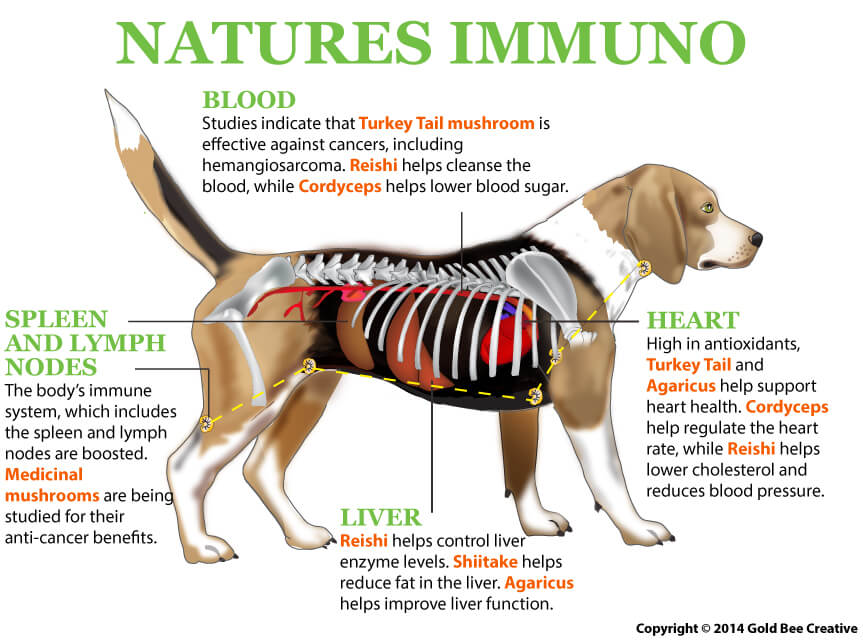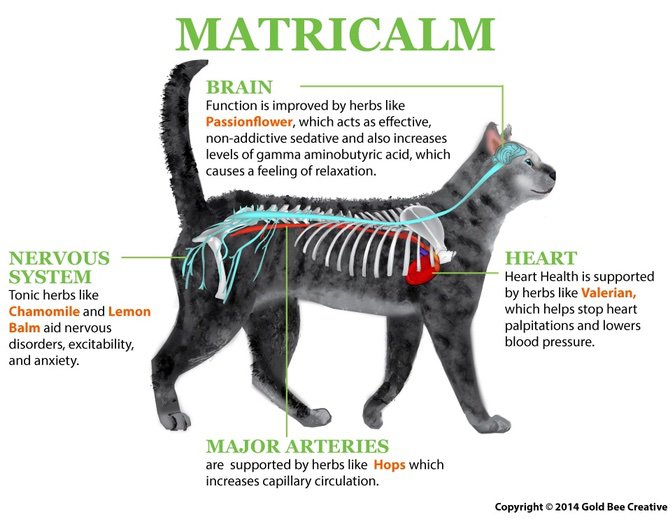medicinal mushroom blend

free shipping over $100 (USA & Canada)
1-877-937-4372 the pet expert hotline

Support for liver and kidney detox and cancer support in dogs


Seizures, or epilepsy, in dogs and cats, is a neurological disorder. It can occur for many different reasons. A seizure occurs when the cerebral cortex functions in an abnormal way. It can also be caused by extracranial reasons (due to reasons outside of the brain) or intracranial reasons (due to reasons inside of the brain).
An extracranial seizure occurs because either the metabolism or the electrophysiology of the brain is changed by disease. In most extracranial cases, the entire cerebral cortex is affected resulting in a generalized seizure rather than a focal or partial seizure. The most common extracranial seizures are caused by underlying kidney disease, liver disease, hypoglycemia, changes in electrolytes, endocrine diseases such as hypothyroidism, hyperthermia, toxins, or trauma.
Intracranial causes of seizures are disease processes that can cause either structural or functional changes inside of your cat or dog’s brain.
Intracranial causes of seizures are disease processes that can cause either structural or functional changes inside of your cat or dog’s brain. Functional changes inside of your pet’s brain may result in what is known as idiopathic epilepsy. Idiopathic epilepsy is a disease in which your dog has recurrent seizures, but no specific cause can be located. Other causes of intracranial seizures are due to brain tumors, viral, bacterial, or fungal infections (distemper virus, rabies, and others), tick-borne diseases, parasitic infections, trauma to the brain, degenerative brain conditions which cause lack of blood flow to the brain causing a cerebral infarction, or nutritional deficiencies such as lack of B vitamins. Idiopathic epilepsy is genetic in many dogs and cat breeds. In these breeds where epilepsy is diagnosed, they should not be used for breeding.
These breeds of dog are more genetically prone to epilepsy, however epilepsy and seizures can occur in any breed
Genetic epilepsy usually manifests itself from 10 months to 3 years of age but can vary. Both the age at onset of seizures and the pattern are important in diagnosing idiopathic epilepsy.
If your pet has experienced seizures, it is very important to have your pet seen by a veterinarian to diagnose the root of the problem. Diagnosing the cause includes full blood work panels including complete blood count, chemistries, infectious and parasitic testing, endocrine testing, as well as imaging such as radiographs and MRI, and spinal fluid analysis. Once the reason for the seizure has been diagnosed, appropriate medical treatment can be recommended. There are integrative holistic therapies available as well for seizure treatment including food therapy, Chinese herbal therapy, and appropriate western herbal therapies through NHV.
Because seizures can be caused by a number of different factors, choosing appropriate herbal supplements varies based on the diagnosis. For example, if your pet is having seizures due to liver disease, NHV Milk Thistle can help to detoxify the body and help to support liver function. Natures Immuno is also excellent liver support and overall immune support. In the case of idiopathic epilepsy, reducing stress may help to reduce the incidence of seizures. NHV Lesstress and NHV Matricalm are both excellent choices for helping to reduce stress and anxiety in your pet.
If your dog has had a seizure, he or she should be examined by your veterinarian as soon as possible. In some cases, diagnostic tests will indicate a clear cause for the seizure or seizures. Where no cause can be located, the disease is diagnosed as idiopathic epilepsy. Together you and your vet can make a health plan to deal with your pet’s seizures. While seizures can be scary they are usually not life-threatening. Your vet can teach you what to do if your dog is having seizures and, in some cases, can provide medicine to make them stop.
If you have any questions regarding your pets health, please don’t hesitate to schedule a consult with us!
medicinal mushroom blend

Vet-Formulated Supplement of Medicinal Mushrooms for Dogs
buy 2 and save $3
3 month supply for a small to medium size pet
Natures Immuno is formulated for dogs from Turkey Tail, Cordyceps, Reishi, Shiitake, and Agaricus mushrooms by a holistic veterinarian and master herbalist. Medicinal mushrooms like these have been used for thousands of years in Chinese medicine as well as traditional herbalism. Researchers around the globe are now studying their potential in helping with cancer, balancing the immune system, and helping with digestive problems and more.


Natures Immuno is formulated for dogs from Turkey Tail, Cordyceps, Reishi, Shiitake, and Agaricus mushrooms by a holistic veterinarian and master herbalist. Medicinal mushrooms like these have been used for thousands of years in Chinese medicine as well as traditional herbalism. Researchers around the globe are now studying their potential in helping with cancer, balancing the immune system, and helping with digestive problems and more.

Natures Immuno Medicinal Mushroom blend for dogs also helps:
Medicinal mushrooms and mushroom extracts are used worldwide to help fight cancer and to help enhance and modulate the immune response of both people and animals. NHV’s mushroom blend contains 5 species of medicinal mushrooms for dogs, which have a long history of use, are well studied, and have been credited with having success against cancer as well as having antioxidant, hypocholesterolemia, anti-tumor, immunomodulatory, anti-allergic, nephroprotective, prebiotic, immunostimulant, anti-inflammatory, cardiovascular, and anti-diabetic properties
Properties of these Medicinal Mushrooms
Benefits of Nature's Immuno Medicinal Mushrooms Blend for Dogs
You can read more about medicinal mushrooms for dogs and how they help give added support to pets for cancer and immunity.
NHV carries a wide range of holistic, natural vet-approved remedies that provide support along with a vet-recommended treatment plan. If you have questions about any of our plant-based supplements, ask an NHV expert, because, at NHV, we want your pet to live healthier and longer naturally.

Turkey Tail mushroom is native to Asia, North America, and Europe. It has a long history of use in traditional herbalism and is currently being studied for its health benefits, including its value in fighting cancer. Research has shown that Turkey Tail is beneficial for many types of cancer as it contains properties that help fight cancer cells while helping to strengthen the immune system. Turkey tail mushroom for dogs has shown to be beneficial in spleen and liver hemangiosarcoma in dogs. It is also useful for heart health, lowering cholesterol, digestive issues, and skin problems.
Cordyceps mushroom is very rich in phytonutrients. Research has indicated that these mushrooms demonstrate anti-tumor, immune enhancing and hypoglycemic activity. It has anti-inflammatory, antioxidant, anti-tumor, anti-cancer, antimetastatic, and antiviral properties. It is very useful for diabetes as it helps lower blood sugar. Cordyceps also help enhance lymphocyte activity, which balance the immune system.
Reishi mushroom has been used for thousands of years in traditional Chinese medicine. It helps detoxify the blood, helps lower cholesterol and reduces blood pressure. It is also beneficial for the lymphatic system, which helps with a dog’s immunity.
Shiitake mushroom is a popular ingredient in cooking and is highly valued in traditional herbalism for its immune stimulating properties. It helps reduce fat in the liver, helps lower cholesterol, and is beneficial for heart health as it aids in reducing plaque in the arteries. Shiitake may help inhibit the growth of leukemia cells. Shiitake is also a good source of protein, vitamins, and minerals.
Agaricus mushroom is cultivated widely for dietary supplements and culinary purposes. Agaricus is useful for bone health, and helps with insulin production and helps with liver function. Agaricus is considered an adaptogen, which helps combat stress and supports the endocrine functions. This mushroom is currently used in Japan as an adjunctive with chemotherapy treatments.
Select your pet's weight to determine the correct dose.
To be taken twice daily.
Determine your pet’s weight and then use the easy chart below to determine the correct dose. You can safely double the recommended dosage.
Pet's Weight Dosage
0 - 15 lb 0.5 mL
16 - 30 lb 1.0 mL
31 - 45 lb 1.5 mL
46 - 60 lb 2.0 mL
61 - 75 lb 2.5 mL
Over 75 lb 3.0 mL
For small animals (rabbits, ferrets), avians and reptiles use 1 drop for every 2 lb of body weight.
How to Administer
Shake well before use. The easiest method is to use the dropper provided and place the drops into your pet’s food or favorite treat. You can also use the dropper and squirt directly into the pet’s mouth. Some pets can be finicky, if this occurs consider hiding the drops in foods most pet’s love such as fish, chicken, yogurt, or a favorite treat. If your pet only eats dry food then soak a few kibbles at feeding time.
For Best Results
Herbal dietary supplements are beneficial to the health and well-being of your pet and are safe for long-term use. Every pet responds to natural herbal supplements differently, therefore it is important to be consistent and administer the product daily. Supplements generally take two to four weeks to take effect, however this will vary from one animal to the next.
Product Storage
All NHV Natural Pet Products are pure herbal extracts and contain no artificial additives, preservatives or coloring. Shelf life after opening is 6 months and must be refrigerated after opening.
Natures Immuno Medicinal Mushroom blend for dogs also helps:
Medicinal mushrooms and mushroom extracts are used worldwide to help fight cancer and to help enhance and modulate the immune response of both people and animals. NHV’s mushroom blend contains 5 species of medicinal mushrooms for dogs, which have a long history of use, are well studied, and have been credited with having success against cancer as well as having antioxidant, hypocholesterolemia, anti-tumor, immunomodulatory, anti-allergic, nephroprotective, prebiotic, immunostimulant, anti-inflammatory, cardiovascular, and anti-diabetic properties
Properties of these Medicinal Mushrooms
Benefits of Nature's Immuno Medicinal Mushrooms Blend for Dogs
You can read more about medicinal mushrooms for dogs and how they help give added support to pets for cancer and immunity.
NHV carries a wide range of holistic, natural vet-approved remedies that provide support along with a vet-recommended treatment plan. If you have questions about any of our plant-based supplements, ask an NHV expert, because, at NHV, we want your pet to live healthier and longer naturally.

Turkey Tail mushroom is native to Asia, North America, and Europe. It has a long history of use in traditional herbalism and is currently being studied for its health benefits, including its value in fighting cancer. Research has shown that Turkey Tail is beneficial for many types of cancer as it contains properties that help fight cancer cells while helping to strengthen the immune system. Turkey tail mushroom for dogs has shown to be beneficial in spleen and liver hemangiosarcoma in dogs. It is also useful for heart health, lowering cholesterol, digestive issues, and skin problems.
Cordyceps mushroom is very rich in phytonutrients. Research has indicated that these mushrooms demonstrate anti-tumor, immune enhancing and hypoglycemic activity. It has anti-inflammatory, antioxidant, anti-tumor, anti-cancer, antimetastatic, and antiviral properties. It is very useful for diabetes as it helps lower blood sugar. Cordyceps also help enhance lymphocyte activity, which balance the immune system.
Reishi mushroom has been used for thousands of years in traditional Chinese medicine. It helps detoxify the blood, helps lower cholesterol and reduces blood pressure. It is also beneficial for the lymphatic system, which helps with a dog’s immunity.
Shiitake mushroom is a popular ingredient in cooking and is highly valued in traditional herbalism for its immune stimulating properties. It helps reduce fat in the liver, helps lower cholesterol, and is beneficial for heart health as it aids in reducing plaque in the arteries. Shiitake may help inhibit the growth of leukemia cells. Shiitake is also a good source of protein, vitamins, and minerals.
Agaricus mushroom is cultivated widely for dietary supplements and culinary purposes. Agaricus is useful for bone health, and helps with insulin production and helps with liver function. Agaricus is considered an adaptogen, which helps combat stress and supports the endocrine functions. This mushroom is currently used in Japan as an adjunctive with chemotherapy treatments.
Select your pet's weight to determine the correct dose.
To be taken twice daily.
Determine your pet’s weight and then use the easy chart below to determine the correct dose. You can safely double the recommended dosage.
Pet's Weight Dosage
0 - 15 lb 0.5 mL
16 - 30 lb 1.0 mL
31 - 45 lb 1.5 mL
46 - 60 lb 2.0 mL
61 - 75 lb 2.5 mL
Over 75 lb 3.0 mL
For small animals (rabbits, ferrets), avians and reptiles use 1 drop for every 2 lb of body weight.
How to Administer
Shake well before use. The easiest method is to use the dropper provided and place the drops into your pet’s food or favorite treat. You can also use the dropper and squirt directly into the pet’s mouth. Some pets can be finicky, if this occurs consider hiding the drops in foods most pet’s love such as fish, chicken, yogurt, or a favorite treat. If your pet only eats dry food then soak a few kibbles at feeding time.
For Best Results
Herbal dietary supplements are beneficial to the health and well-being of your pet and are safe for long-term use. Every pet responds to natural herbal supplements differently, therefore it is important to be consistent and administer the product daily. Supplements generally take two to four weeks to take effect, however this will vary from one animal to the next.
Product Storage
All NHV Natural Pet Products are pure herbal extracts and contain no artificial additives, preservatives or coloring. Shelf life after opening is 6 months and must be refrigerated after opening.
stress & anxiety support

Natural Support for Canine Stress and Anxiety
buy 2 and save $3
3 month supply for a small to medium size pet
Everyone knows what stress feels like, and we all know that too much stress can make us ill—high blood pressure, ulcers and even cancer can result from excessive stress. Like us, dogs can get stressed by numerous factors as well. Help your furkiddo relax into a long and happy life with NHV Lesstress - a natural dog stress support.


Everyone knows what stress feels like, and we all know that too much stress can make us ill—high blood pressure, ulcers and even cancer can result from excessive stress. Like us, dogs can get stressed by numerous factors as well. Help your furkiddo relax into a long and happy life with NHV Lesstress - a natural dog stress support.

Natural Dog Stress Reliever Supplemental Support
With a heightened sense of hearing and smell, small events that seem mundane to us can be terrifying and stressful for your dogs. Sometimes the stress is from the ride to the office, or maybe they are missing their human companions. This all contributes to changes in behavior like excessive panting, drooling, sweaty paws, dilated eyes, pacing, excessively shedding, or just completely shutting down. Some dogs become so stressed that it may lead to fear and aggression.
Other forms of stress in a dog’s life include:
In addition to panting, excessive barking/whining, chewing on themselves, shivering (when it’s not cold), panicked tail wagging, or tense muscles, stress can also cause GI tract issues such as diarrhea or vomiting.
The key to a healthy pup is balance. Too much or too little activity can be harmful, as well as too much or too little socialization. A balanced, clean diet also helps maintain the body and the mind. If your dog is susceptible to stress, you can use calming herbs like those found in NHV Lesstress. This formulation gently acts on the nervous system and immune system to provide a natural dog stress reliever.
How NHV’s Natural Dog Stress Relief Eases Stress and Anxiety
For stressful experiences such as separation anxiety, the loss or addition of a furry friend, special events (eg. fireworks) and illness (stress can cause conditions to worsen), the natural (non-addictive) sedative properties of Lesstress gently relax the nervous system and endocrine system. Ingredients like Chamomile, Passion Flower and Lemon Balm work to calm nerves while ingredients like Reishi, Eleuthero, and Echinacea Angustifolia are very beneficial for helping the body adapt to stress and illness and stimulate healthy immune function.
Help Support Your Dog Naturally
All NHV supplements like Lesstress are 100% natural and created by a holistic veterinarian and a master herbalist, specially formulated for pets. Feel free to contact our veterinary professionals to get more insight into your little one’s health and wellbeing.
Made with the finest, organically grown, or ethically harvested herbs. Made specifically for pets, vet-formulated and vet approved.
Lesstress for Dogs
Select your pet's weight to determine the correct dose.
To be taken twice daily. Determine your pet’s weight and then use the easy chart below to determine the correct dose. This is the minimum dosage.
Pet's Weight Dosage
0 - 15 lb = 0.5 ml
16 - 30 lb = 1.0 ml
31 - 45 lb = 1.5 ml
46 - 60 lb = 2.0 ml
61 - 75 lb = 2.5 ml
Over 75 lb = 3.0 ml
For small animals (rabbits, ferrets), avians and reptiles use 1 drop for every 2 lb of body weight.
How to Administer
Shake well before use.
The easiest method is to use the dropper provide and places the drops into your pet’s food or favorite treat. You can also use the dropper and squirt directly into the pet’s mouth.
Some pets can be finicky, if this occurs consider hiding the drops in foods most pet’s love such as fish, chicken or yogurt or a favourite treat. If your pet only eats dry food then soak a few kibbles at feeding time.
For Best Results
Herbal dietary supplements are beneficial to the health and wellbeing of your pet and are safe for long-term use. Every pet responds to natural herbal supplements differently, therefore it is important to be consistent and administer the product daily. Supplements generally take two to four weeks to take effect, however this will vary from one animal to the next.
Product Storage
All NHV Natural Pet Products are pure herbal extracts and contain no artificial additives, preservatives or coloring. Shelf life after opening is 6 months and must be refrigerated after opening.
Cautions and Contraindications
Do not use Lesstress in pregnant or nursing animals.
Speak to your vet before using our products. A second visit is recommended if your pet’s condition does not improve, or deteriorates after continued use of the supplements.
All information provided by NHV Natural Pet Products is for educational purposes only.
Natural Dog Stress Reliever Supplemental Support
With a heightened sense of hearing and smell, small events that seem mundane to us can be terrifying and stressful for your dogs. Sometimes the stress is from the ride to the office, or maybe they are missing their human companions. This all contributes to changes in behavior like excessive panting, drooling, sweaty paws, dilated eyes, pacing, excessively shedding, or just completely shutting down. Some dogs become so stressed that it may lead to fear and aggression.
Other forms of stress in a dog’s life include:
In addition to panting, excessive barking/whining, chewing on themselves, shivering (when it’s not cold), panicked tail wagging, or tense muscles, stress can also cause GI tract issues such as diarrhea or vomiting.
The key to a healthy pup is balance. Too much or too little activity can be harmful, as well as too much or too little socialization. A balanced, clean diet also helps maintain the body and the mind. If your dog is susceptible to stress, you can use calming herbs like those found in NHV Lesstress. This formulation gently acts on the nervous system and immune system to provide a natural dog stress reliever.
How NHV’s Natural Dog Stress Relief Eases Stress and Anxiety
For stressful experiences such as separation anxiety, the loss or addition of a furry friend, special events (eg. fireworks) and illness (stress can cause conditions to worsen), the natural (non-addictive) sedative properties of Lesstress gently relax the nervous system and endocrine system. Ingredients like Chamomile, Passion Flower and Lemon Balm work to calm nerves while ingredients like Reishi, Eleuthero, and Echinacea Angustifolia are very beneficial for helping the body adapt to stress and illness and stimulate healthy immune function.
Help Support Your Dog Naturally
All NHV supplements like Lesstress are 100% natural and created by a holistic veterinarian and a master herbalist, specially formulated for pets. Feel free to contact our veterinary professionals to get more insight into your little one’s health and wellbeing.
Made with the finest, organically grown, or ethically harvested herbs. Made specifically for pets, vet-formulated and vet approved.
Lesstress for Dogs
Select your pet's weight to determine the correct dose.
To be taken twice daily. Determine your pet’s weight and then use the easy chart below to determine the correct dose. This is the minimum dosage.
Pet's Weight Dosage
0 - 15 lb = 0.5 ml
16 - 30 lb = 1.0 ml
31 - 45 lb = 1.5 ml
46 - 60 lb = 2.0 ml
61 - 75 lb = 2.5 ml
Over 75 lb = 3.0 ml
For small animals (rabbits, ferrets), avians and reptiles use 1 drop for every 2 lb of body weight.
How to Administer
Shake well before use.
The easiest method is to use the dropper provide and places the drops into your pet’s food or favorite treat. You can also use the dropper and squirt directly into the pet’s mouth.
Some pets can be finicky, if this occurs consider hiding the drops in foods most pet’s love such as fish, chicken or yogurt or a favourite treat. If your pet only eats dry food then soak a few kibbles at feeding time.
For Best Results
Herbal dietary supplements are beneficial to the health and wellbeing of your pet and are safe for long-term use. Every pet responds to natural herbal supplements differently, therefore it is important to be consistent and administer the product daily. Supplements generally take two to four weeks to take effect, however this will vary from one animal to the next.
Product Storage
All NHV Natural Pet Products are pure herbal extracts and contain no artificial additives, preservatives or coloring. Shelf life after opening is 6 months and must be refrigerated after opening.
Cautions and Contraindications
Do not use Lesstress in pregnant or nursing animals.
Speak to your vet before using our products. A second visit is recommended if your pet’s condition does not improve, or deteriorates after continued use of the supplements.
All information provided by NHV Natural Pet Products is for educational purposes only.
anxiety & aggression support

Natural Help for Stress Reduction, Anxiety Relief, Behavioral Problems, and Aggression in Cats
buy 2 and save $3
3 month supply for a small to medium size pet
Matricalm is an all-natural supplement that provides anxiety and stress relief in cats and promotes calm behavior.

Matricalm is an all-natural supplement that provides anxiety and stress relief in cats and promotes calm behavior.
Help reduce aggressive behavior and provide anxiety and stress relief for your cat with Matricalm, a natural herbal product designed to help reduce excitability in your pet. Cats can become anxious or aggressive when exposed to other animals or to people they are unfamiliar with. When this occurs they may hiss, scratch, howl, or urinate inappropriately.
It’s important to remember that a significant cause of illness in pets results from stress. Helping to keep your cat stress free can help keep them healthier for longer. NHV Pet Experts also often recommend Matricalm for cats dealing with FIV, cancer, kidney issues, hyperthyroidism, and more.
See how NHV Matricalm helped kitty Kima with yowling and stress.

Chamomile – Contains sedative properties. Chamomile also helps the immune system and has a strong affinity for the nervous system.
Passion Flower – An effective, non-addictive sedative. It helps increase gamma-aminobutyric acid (GABA) in the brain, which helps cause a feeling of relaxation. Passion Flower also has strong anti-inflammatory and pain-relieving properties.
Lemon Balm – An aromatic herb used for nervous disorders, excitability, and anxiety. In addition, lemon balm helps lower blood pressure.
Valerian – Helps stop heart palpitations, relaxes spasms, relieves pain, and regulates the nervous system. Valerian also helps improve sleep latency and sleep quality.
Hops – Tension, anxiety, and stress relief in cats. Hops have traditionally been used to help with mood disturbances, such as restlessness and anxiety.
Select your pet's weight to determine the correct dose.
To be taken twice daily. Determine your pet’s weight and then use the easy chart below to determine the correct dose. This is the minimum dosage.
Pet's Weight Dosage
0 - 15 lb = 0.5 ml
16 - 30 lb = 1.0 ml
31 - 45 lb = 1.5 ml
46 - 60 lb = 2.0 ml
61 - 75 lb = 2.5 ml
Over 75 lb = 3.0 ml
How to Administer
Shake well before use. The easiest method is to use the dropper provided and place the drops into your pet’s food or favorite treat. You can also use the dropper and squirt directly into the pet’s mouth.
Some pets can be finicky. If this occurs, consider hiding the drops in foods most pets love, such as fish, chicken, yogurt or a favorite treat. If your pet only eats dry food, then soak a few kibbles at feeding time.
For Best Results
Herbal dietary supplements are beneficial to the health and well-being of your pet and are safe for long-term use. Every pet responds to natural herbal supplements differently. Therefore, it is important to be consistent and administer the product daily. Supplements generally take two to four weeks to take effect; however, this interval will vary from one animal to the next.
Product Storage
All NHV Natural Pet Products are pure herbal extracts and contain no artificial additives, preservatives, or coloring. Shelf life after opening is six months, and it must be refrigerated after opening.
Cautions and Contraindications
Do not use Matricalm for cats as stress relief in pregnant or nursing animals. Speak to your vet before using our products. A second visit is recommended if your pet’s condition does not improve or deteriorates after the continued use of the supplements.
All information provided by NHV Natural Pet Products is for educational purposes only.
Help reduce aggressive behavior and provide anxiety and stress relief for your cat with Matricalm, a natural herbal product designed to help reduce excitability in your pet. Cats can become anxious or aggressive when exposed to other animals or to people they are unfamiliar with. When this occurs they may hiss, scratch, howl, or urinate inappropriately.
It’s important to remember that a significant cause of illness in pets results from stress. Helping to keep your cat stress free can help keep them healthier for longer. NHV Pet Experts also often recommend Matricalm for cats dealing with FIV, cancer, kidney issues, hyperthyroidism, and more.
See how NHV Matricalm helped kitty Kima with yowling and stress.

Chamomile – Contains sedative properties. Chamomile also helps the immune system and has a strong affinity for the nervous system.
Passion Flower – An effective, non-addictive sedative. It helps increase gamma-aminobutyric acid (GABA) in the brain, which helps cause a feeling of relaxation. Passion Flower also has strong anti-inflammatory and pain-relieving properties.
Lemon Balm – An aromatic herb used for nervous disorders, excitability, and anxiety. In addition, lemon balm helps lower blood pressure.
Valerian – Helps stop heart palpitations, relaxes spasms, relieves pain, and regulates the nervous system. Valerian also helps improve sleep latency and sleep quality.
Hops – Tension, anxiety, and stress relief in cats. Hops have traditionally been used to help with mood disturbances, such as restlessness and anxiety.
Select your pet's weight to determine the correct dose.
To be taken twice daily. Determine your pet’s weight and then use the easy chart below to determine the correct dose. This is the minimum dosage.
Pet's Weight Dosage
0 - 15 lb = 0.5 ml
16 - 30 lb = 1.0 ml
31 - 45 lb = 1.5 ml
46 - 60 lb = 2.0 ml
61 - 75 lb = 2.5 ml
Over 75 lb = 3.0 ml
How to Administer
Shake well before use. The easiest method is to use the dropper provided and place the drops into your pet’s food or favorite treat. You can also use the dropper and squirt directly into the pet’s mouth.
Some pets can be finicky. If this occurs, consider hiding the drops in foods most pets love, such as fish, chicken, yogurt or a favorite treat. If your pet only eats dry food, then soak a few kibbles at feeding time.
For Best Results
Herbal dietary supplements are beneficial to the health and well-being of your pet and are safe for long-term use. Every pet responds to natural herbal supplements differently. Therefore, it is important to be consistent and administer the product daily. Supplements generally take two to four weeks to take effect; however, this interval will vary from one animal to the next.
Product Storage
All NHV Natural Pet Products are pure herbal extracts and contain no artificial additives, preservatives, or coloring. Shelf life after opening is six months, and it must be refrigerated after opening.
Cautions and Contraindications
Do not use Matricalm for cats as stress relief in pregnant or nursing animals. Speak to your vet before using our products. A second visit is recommended if your pet’s condition does not improve or deteriorates after the continued use of the supplements.
All information provided by NHV Natural Pet Products is for educational purposes only.
Published: March 16, 2018